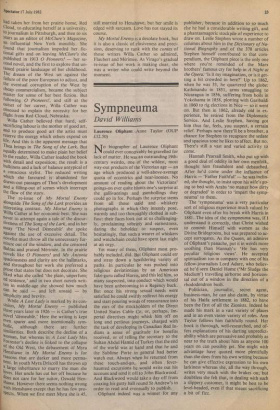Sympneuma
David Williams
No biographer of Laurence Oliphant could ever conceivably be gravelled for lack of matter. He was an outstanding 19th- century weirdo, one of the wildest, most way-out products of the Victorian age — an age which produced a well-above-average quota of eccentrics and near-loonies. No amount of reading about the Victorians' goings-on ever quite blunts one's surprise at the gallivantings and gambollings they could go in for. Perhaps the surprise stems from all those staid and whiskery photographs in which they intently pose, warmly and too thoroughly clothed in sub- fusc: their faces look out at us challenging- ly, proclaiming sobriety and earnestness, daring the beholder to suspect, even hesitatingly, that such a wearer of whiskers and watchchain could have spent last night at an orgy.
Yet many of them, Oliphant most pro- bably included, did. But Oliphant could err and stray down a bewildering variety of paths. In particular he was pushed into religious deviationism by an American fake-guru called Harris, and this led him, so many suspected, into conduct which would have been unbecoming in a Regency buck. But once his strong sexual needs were satisfied he could swiftly redirect his energy and start pouring words of reassurance into the ears of the stockholders of the Direct United States Cable Co; or, perhaps, Im- perial directives might whisk him off on long and perilous journeys, charged with' the task of developing in Canadian Red In- dians a sense of gratitude for benefits received, or of telling the secretary to the Sultan Abdul Hamid of Turkey that the end of the world was at hand and that he and the Sublime Porte in general had better watch out. Always when he returned from these touch-and-go, and often fever- haunted excursions he would write out his account and send it off to John Blackwood. And Blackwood would take a day off from coaxing his gutty ball round St Andrew's in order to read and eventually to publish.
Oliphant indeed was a winner for any publisher, because in addition to so much else he had a considerable writing gift, and a phantasmagoric stockpile of experience to draw on. Leslie Stephen wrote a number of columns about him in the Dictionary of Na- tional Biography and of the 378 articles Stephen himself contributed to that com- pendium, the Oliphant piece is the only one where you're reminded of the Marx brothers' famous cry for help in A Night at the Opera: 'Is it my imagination, or is it get- ting a bit crowded in here?' Up to 1862, when he was 33, he quartered the globe: Kathmandu in 1851, arms smuggling to Nicaragua in 1856, suffering from boils in Yokohama in 1858, plotting with Garibaldi in 1860 to rig elections in Nice — so it went on. But then in 1862, already old in ex- perience, he retired from the Diplomatic Service. And Leslie Stephen, having got him thus far, feels, you suspect, a certain relief. Perhaps now there'll be a breather, a chance for Stephen to recapture the sedate and spacious tone he likes to affect. But no. There's still a vast and varied activity to come.
Hannah Pearsall Smith, who put up with a good deal of oddity in her own menfolk, thought him fraudulent and debauched. After he'd come under the influence of Harris — 'Father Faithful' — he was inclin- ed, she thought, to insist upon his wife's go- ing to bed with Arabs `no matter how dirty or degraded' in order to 'impart the symp- neuma' to them.
The `sympneuma' was a very particular sort of religious experience much valued by Oliphant even after his break with Harris in 1881. The idea of the sympneuma was, if I understand it correctly, that Christ wished to commit Himself with women as the Divine Bridegroom, but was prepared to ac- cept surrogates. As the Queen, an admirer of Oliphant's panache, put it in words more soothing than Hannah's: 'He has very peculiar religious views'. He accepted spiritualism too in company with one of his fellow-journalists Lord Adare, who believ- ed he'd seen Daniel Home (`Mr Sludge the Medium') travelling airborne and horizon- tal out of a window in the direction of a rhododendron bush.
Politician, journalist, secret agent, business-man, he can also claim, by virtue of his Haifa settlement in 1882, to have been the first of all the Zionists. Indeed he made his mark in a vast variety of places and in an even vaster variety of roles. Ann Taylor follows him faithfully round. Her book is thorough, well-researched, and of- fers explanations of his darting unpredict- ability which are persuasive and probably as near to the truth about him as anyone 100 years on can possibly get. She might with advantage have quoted more plentifully than she does from his own writing because he can give effective expression to his own larkiness whereas she, all the way through, writes very much with the brakes on; but doubtless she felt that, in dealing with such a slippery customer, it might be best to be level-headed, even if that meant sacrificing a bit of fizz.


































 Previous page
Previous page